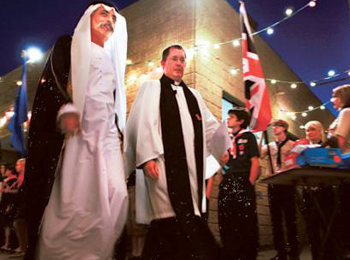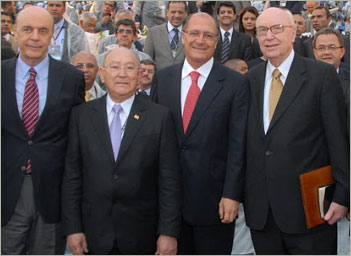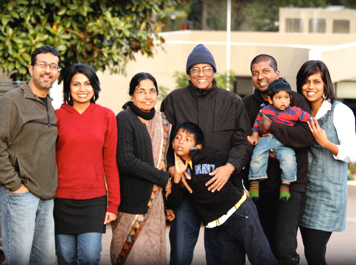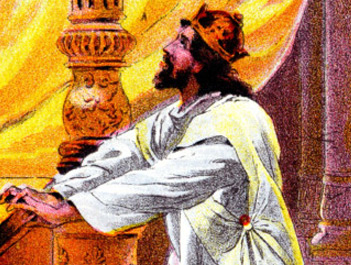Philip Clarke spent most of the 1990s in Africa, both as a humanitarian aid worker and as a tropical forest researcher. He then worked for nine years as an executive director of Médecins Sans Frontières (Doctors Without Borders), before founding the war crimes investigation agency, Bloodhound.
Falling Night is Phil Clarke’s debut novel, based on actual experiences by the author or his acquaintances in the various wars that took place in Africa during the 1990s, but using fictional characters.
THIS is London,” the radio announced in a polished English accent, followed by the uplifting theme of the BBC World Service News.
Listening to the headlines had become a regular suppertime ritual at the MedRelief base. The team were bored and irritated with each other, so a daily dose of current events was required to provide alternative topics for conversation that had nothing to do with the medical programme, the war, or the local staff.
Alan had never taken any notice of the news beyond the sports results. His arrival in Kugombwala changed that, for the conflict was a major focus of media attention, and it was encouraging to hear the country’s regular mention in the headlines. Were his friends back in Britain listening to the news and thinking of him? He hoped so.
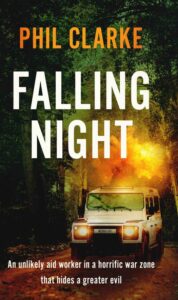 But over recent weeks, there had been a drop in reports about Kugombwala, following the departure of the United Nations peacekeepers. Western media had lost interest in the incomprehensible squabble between rival clans in a faraway continent, and without the presence of U.N. troops, the conflict held little international news appeal.
But over recent weeks, there had been a drop in reports about Kugombwala, following the departure of the United Nations peacekeepers. Western media had lost interest in the incomprehensible squabble between rival clans in a faraway continent, and without the presence of U.N. troops, the conflict held little international news appeal.
Jules turned up the volume to broadcast the headlines. That night, like the previous fortnight, there was no mention of Kugombwala. He turned down the sound after the main stories had been announced but kept the radio playing so he could still hear what was said. Fifteen minutes later, he interrupted Paula’s monologue about incompetent local colleagues.
“Shh,” he ordered. “It’s a report from Kugombwala.”
They all fell silent to concentrate on the radio.
“The recent withdrawal of the United Nations from Kugombwala has caused the country to disintegrate into a multi-factional civil war that regional peacekeeping soldiers of the Organisation of African Unity’s African Battle Group—known as AfriBat—have failed to contain. Kugombwala is now divided into separate territories controlled by different militia groups, who tax the local population for food and funds when they are not fighting each other. One of these factions, the Kugombwalan Patriots—or ‘KP Nuts,’ as they are locally called—is, however, an army with a difference. For it is an army of small boys.”
There was a perceptible pause in the narration, as the reporter allowed time for his statement to resonate.
“I travelled for six hours through thick jungle to meet the leader of the Kugombwalan Patriots. Major MacAmos Buo is a young man in his early twenties and has created a remarkable rebel force comprising youngsters half his age. He is known to his troops as ‘boss-brother,’ and I asked him why he was using children in his liberation struggle.”
“My man,” broke in a slurred voice, edited to follow the narrative, “I no can make them come; they is coming by themselves. Every day, more boys come to me. They want to fight, and I make them into warriors. I teach them how to kill. I show them that small boys can be stronger than big men.”
“But, Major,” the reporter interrupted, “what makes these boys come to you?”
There was a slight laugh. “Them boys can want payback. They see their fathers and brothers killed, their mothers and sisters raped. I give them new family, and I give them a weapon for to get revenge.”
The report then concluded. “A senior UNICEF official has expressed concern with this latest development in the Kugombwalan civil war. There are unsubstantiated reports that the KP child-soldiers kidnap young boys during their attacks on villages, who are then forced to become fellow warrior slaves. This is Mark Jeffreys in Ogugawa, Kugombwala.”
Jules turned off the radio. There was a stunned silence, broken by Lorna.
“I was expecting this to happen sooner or later. We’ve seen this before in Africa: Mozambique, Uganda, Liberia, and Sierra Leone. Those wars have shown that kids make the bravest and most loyal soldiers—and also the most vicious.”
To know more about the book and the author, click here.









